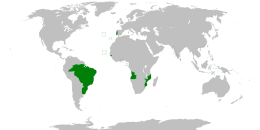More languages
More actions
| Kingdom of Portugal Reino de Portugal | |
|---|---|
| 1139–1910 | |
 | |
| Capital | Lisbon |
| Official languages | Portuguese Latin |
| Dominant mode of production | Feudalism |
| Government | Monarchy |
The Kingdom of Portugal was a kingdom located on the Iberian Peninsula. It was the first European power to begin colonizing Africa.[1]
Colonialism[edit | edit source]
Early exploration of Africa[edit | edit source]
In 1415, Prince Enrique, son of King João, fought against the Arabs and captured their fortress of Ceuta on the Moroccan coast. In 1434, Enrique sent Gil Eanes on an expedition to Cape Bojador (modern-day Western Sahara). In 1441, Antão Gonçalves and Nuno Tristão sailed to Cabo Blanco (Mauritania) and brought back gold and ten slaves. The next year, the Pope gave Portugal the authority to rule all lands it could conquer between Cape Bojador and India. In 1445, João Fernandes landed in Rio do Ouro (Western Sahara) and explored eastward into the Sahara for seven months. Dinis Dias reached the mouth of the Senegal River and Cabo Verde in 1446. Lancerot reached the Gambia River in 1448. Around the same time, Portugal also commissioned the Italian explorers Alvise Cadamosto and Antoniotto Usodimare to explore the Senegal and Gambia rivers. Diogo Gomes reached Sierra Leone in 1460, and Pedro de Sintra reached modern-day Liberia in 1462.[1]
King Afonso V gave Fernão Gomes exclusive trading rights with Africa from 1469 to 1474 provided that he explored 300 new miles of coastline every year. During this period, Portugal reached the Gold Coast (modern-day Ghana) and São Tomé and Príncipe. Diogo Cão sailed up the Congo River in 1482 and again in 1485, kidnapping some Africans during the second voyage and bringing them to Portugal. In 1486, João Afonso d'Avaro reached Benin. In 1487, Pêro d'Évora and Gonçales Eanes sailed to Senegal and explored inland to reach Timbuktu.[1]
References[edit | edit source]
- ↑ 1.0 1.1 1.2 Sík Endre (1970). The History of Black Africa, vol. 1: 'Relations of the Peoples of the Ancient and Medieval World with Black Africa; Discovery of Black Africa by the Portuguese'. [PDF] Budapest: Akadémiai Kiadó.


